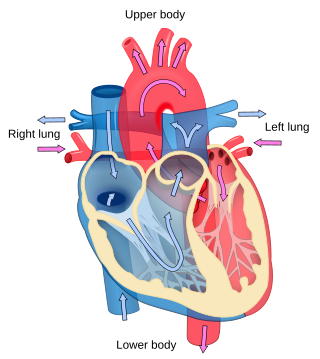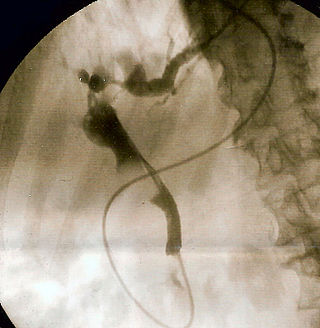Related Research Articles

Cardiology is the study of the heart. Cardiology is a branch of medicine that deals with disorders of the heart and the cardiovascular system. The field includes medical diagnosis and treatment of congenital heart defects, coronary artery disease, heart failure, valvular heart disease, and electrophysiology. Physicians who specialize in this field of medicine are called cardiologists, a specialty of internal medicine. Pediatric cardiologists are pediatricians who specialize in cardiology. Physicians who specialize in cardiac surgery are called cardiothoracic surgeons or cardiac surgeons, a specialty of general surgery.

Hepatology is the branch of medicine that incorporates the study of liver, gallbladder, biliary tree, and pancreas as well as management of their disorders. Although traditionally considered a sub-specialty of gastroenterology, rapid expansion has led in some countries to doctors specializing solely on this area, who are called hepatologists.

Heart murmurs are unique heart sounds produced when blood flows across a heart valve or blood vessel. This occurs when turbulent blood flow creates a sound loud enough to hear with a stethoscope. Turbulent blood flow is not smooth. The sound differs from normal heart sounds by their characteristics. For example, heart murmurs may have a distinct pitch, duration and timing. The major way health care providers examine the heart on physical exam is heart auscultation; another clinical technique is palpation, which can detect by touch when such turbulence causes the vibrations called cardiac thrill. A murmur is a sign found during the cardiac exam. Murmurs are of various types and are important in the detection of cardiac and valvular pathologies.
Hypertrophic cardiomyopathy is a condition in which the heart becomes thickened without an obvious cause. The parts of the heart most commonly affected are the interventricular septum and the ventricles. This results in the heart being less able to pump blood effectively and also may cause electrical conduction problems.

Cardiac surgery, or cardiovascular surgery, is surgery on the heart or great vessels performed by cardiac surgeons. It is often used to treat complications of ischemic heart disease ; to correct congenital heart disease; or to treat valvular heart disease from various causes, including endocarditis, rheumatic heart disease, and atherosclerosis. It also includes heart transplantation.

Pulmonary atresia is a congenital malformation of the pulmonary valve in which the valve orifice fails to develop. The valve is completely closed thereby obstructing the outflow of blood from the heart to the lungs. The pulmonary valve is located on the right side of the heart between the right ventricle and pulmonary artery. In a normal functioning heart, the opening to the pulmonary valve has three flaps that open and close.

Atrioventricular septal defect (AVSD) or atrioventricular canal defect (AVCD), also known as "common atrioventricular canal" or "endocardial cushion defect" (ECD), is characterized by a deficiency of the atrioventricular septum of the heart that creates connections between all four of its chambers. It is a very specific combination of 3 defects:

Disopyramide is an antiarrhythmic medication used in the treatment of ventricular tachycardia. It is a sodium channel blocker and therefore classified as a Class 1a anti-arrhythmic agent. Disopyramide has a negative inotropic effect on the ventricular myocardium, significantly decreasing the contractility. Disopyramide also has an anticholinergic effect on the heart which accounts for many adverse side effects. Disopyramide is available in both oral and intravenous forms, and has a low degree of toxicity.
Septal myectomy is a cardiac surgery treatment for hypertrophic cardiomyopathy (HCM). The open-heart surgery entails removing a portion of the septum that is obstructing the flow of blood from the left ventricle to the aorta.
Alcohol septal ablation (ASA) is a minimally invasive heart procedure to treat hypertrophic cardiomyopathy (HCM).
The Trilogy of Fallot also called Fallot's trilogy is a rare congenital heart disease consisting of the following defects: pulmonary valve stenosis, right ventricular hypertrophy and atrial septal defect. It occurs in 1.2% of all congenital heart defects.
Gerald Murray Lawrie, M.D. is an American heart surgeon and pioneer in the surgical treatment of valvular heart disease of Australian descent.
Ulrich Sigwart is a German retired cardiologist known for his pioneering role in the conception and clinical use of stents to keep blood vessels open, and introducing a non-surgical intervention, alcohol septal ablation for the treatment of hypertrophic obstructive cardiomyopathy.
Srihari S. Naidu is an American physician and Professor of Medicine at New York Medical College who is known for his work on hypertrophic cardiomyopathy including the procedure known as alcohol septal ablation, and for helping to construct the universal diagnostic criteria for cardiogenic shock.

Nina Starr Braunwald (1928–1992) was an American thoracic surgeon and medical researcher who was among the first women to perform open-heart surgery. She was also the first woman to be certified by the American Board of Thoracic Surgery, and the first to be elected to the American Association for Thoracic Surgery. In 1960, at the age of 32, she led the operative team at the U.S. National Institutes of Health (NIH) that implanted the first successful artificial mitral human heart valve replacement, which she had designed and fabricated. She died in August 1992 in Weston, Massachusetts, after a career that included prominent appointments at the NIH, University of California, San Diego, Harvard Medical School, and Brigham and Women's Hospital.

Emphysema is any air-filled enlargement in the body's tissues. Specifically emphysema refers to the enlargement of air spaces (alveoli) in the lungs, and is also known as pulmonary emphysema.

Prafulla Kumar Sen MD was an Indian vascular and cardiothoracic surgeon, who led the first human heart transplant procedure in India in 1968 and became the fourth surgeon in the world to carry out this operation. It was also the sixth attempt at this procedure in the world.
William Paton Cleland FRCS FRCP FACS was an Australian born British cardiothoracic surgeon and was one of the early pioneers of open-heart surgery.

Charles Knight MD FRCP OBE is a British professor of cardiology and chief executive of St Bartholomew's Hospital, part of Barts Health NHS Trust.

Mavacamten, sold under the brand name Camzyos, is a medication used to treat obstructive hypertrophic cardiomyopathy.
References
- ↑ Smith, J. Y. (17 August 1982). "Dr. Andrew G. Morrow, 60, Chief Of Surgery at the Heart Institute". Washington Post. Archived from the original on 28 May 2023. Retrieved 30 October 2022.
- ↑ Maron, Barry J.; Roberts, William C. (21 June 2016). "The Father of Septal Myectomy for Obstructive HCM, Who Also Had HCM". Journal of the American College of Cardiology. 67 (24): 2900–2903. doi:10.1016/j.jacc.2016.05.002. PMID 27311529. S2CID 205579317.
- ↑ Yale, Steven H.; Tekiner, Halil; Mazza, Joseph J.; Yale, Eileen S.; Yale, Ryan C. (2021). "18. Vital signs". Cardiovascular Eponymic Signs: Diagnostic Skills Applied During the Physical Examination. Switzerland: Springer. pp. 403–404. ISBN 978-3-030-67595-0.
- ↑ "Dr. Andrew Glenn Morrow's Plaque". onih.pastperfectonline.com. Archived from the original on 28 May 2023. Retrieved 30 October 2022.
- ↑ "NLM History of Medicine Division Finding Aids". findingaids.nlm.nih.gov. Retrieved 29 May 2023.